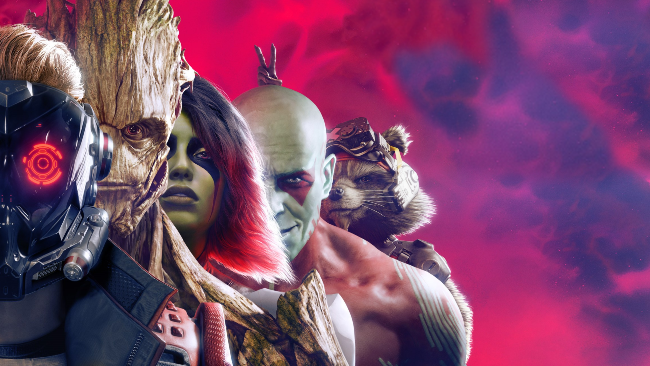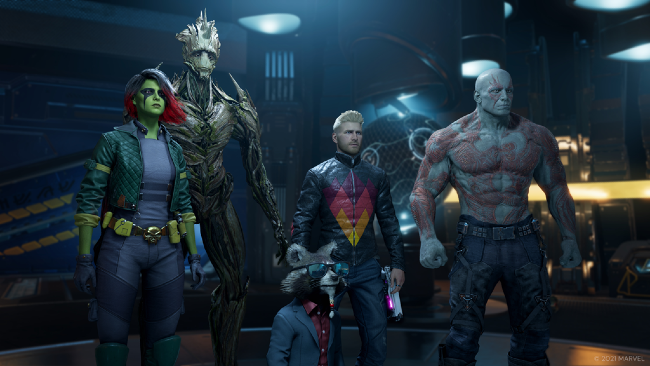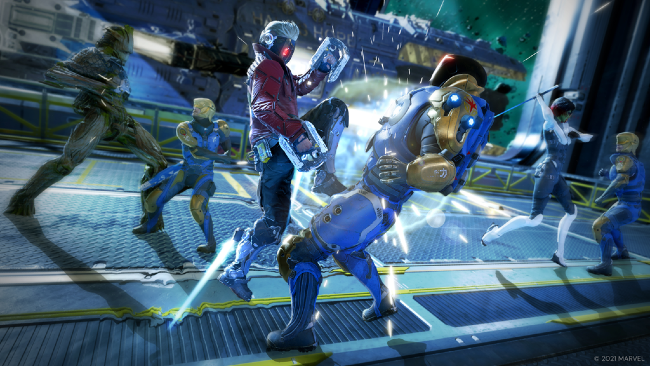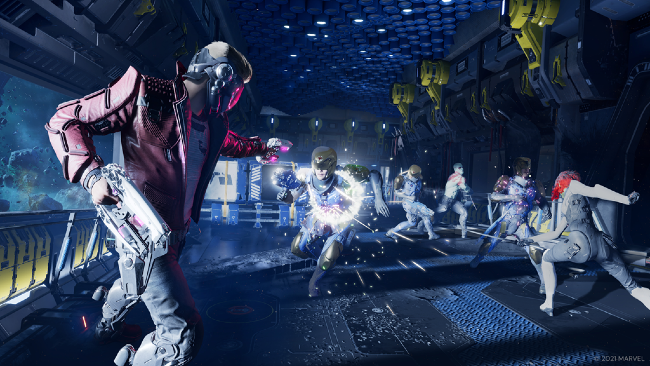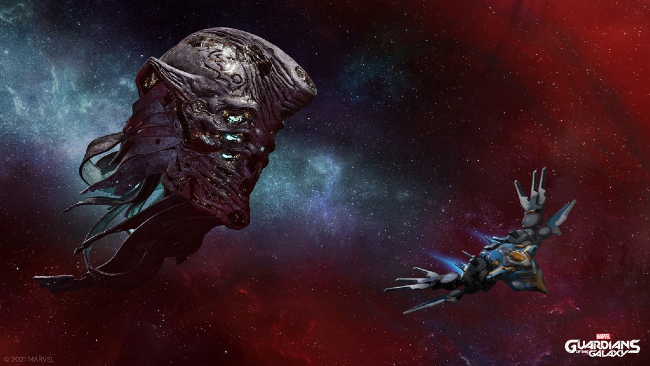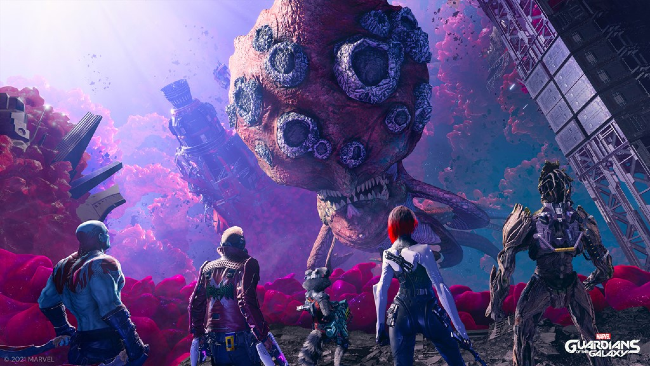A band of endearing galactic miscreants, the Guardians of the Galaxy captured everyone’s neon ’80s-loving hearts with Marvel’s 2014 and 2017 films (as well as the group’s place within the wider Marvel Cinematic Universe). Even with Marvel’s recent forays into video games—and even Telltale’s own crack at taking on Guardians in a game—it was something of a surprise to see Square Enix and Eidos Montreal making a Guardians of the Galaxy game, and a single-player one at that. Finding itself somewhere between Marvel meets Uncharted and Mass Effect, Marvel’s Guardians of the Galaxy hits all the right notes, exactly the Guardians of the Galaxy game I wanted it to be.
On a job that leads them into the restricted Quarantine Zone, the Guardians are caught by Nova Corps and saddled with a hefty fine. An unfortunate turn of events (or perhaps a few turns of events) wraps the Guardians up in a plot that would end the galaxy as we know it. But the solution to the threat might not be so straightforward, and will require each member of the team to battle demons both internal and external as they search for a way to live up to their namesake.
What Guardians immediately gets right is the consistent and hilarious banter. When you have five very different characters on a quest to save the galaxy together, there’s rarely going to be a moment of silence, and the void of silence is filled with contextual back and forth among Peter Quill’s Star-Lord, Rocket, Groot, Gamora, and Drax. Whether it’s exploring the cliffs of unknown worlds or fighting off groups of baddies, someone always has something to say.
These interactions are always appropriate to the moment, like the jabs made at Peter Quill by other characters when you go off to explore a side path. Conversation fills the game, the only downside being that sometimes lines are cut short if you trigger the next sequence or area before one finishes. Quips being a key part of what people love about Guardians of the Galaxy, I loved every witty conversation. Rarely did I hear repeat lines except in battles when a few catchphrases would come up multiple times as the fight dragged on.
But Guardians of the Galaxy is as much about its heart and deep characters as it is the goofy comedy and epic ’80s overtones. The squabbling camaraderie amongst these five very different characters is offset by heartfelt conversations that betray just how similar they actually all are. And Eidos Montreal nailed this tonal balance, weaving between guarded humor and characters actually opening up. Marvel’s Guardians of the Galaxy’s take on each character—and their relationships—feels both completely unique and entirely faithful to who they are.
Reluctant heroes the lot of them, Guardians of the Galaxy isn’t an origin story. The Guardians are already a registered group of galactic heroes for hire, having pulled numerous jobs together before the outset of the game (even if Groot did mis-enter their name as “Gardeners of the Galaxy”). However, far be it from being an origin story for the group, Eidos Montreal’s take on the Guardians delves into each of their respective histories in important ways that creates an interwoven character-structured narrative, which ultimately supports and elevates the entire experience. And each character is allowed ample opportunity for personal growth and development to better come together and support the team.
Star-Lord’s abduction from Earth. Gamora’s tutelage under Thanos. Rocket undergoing experimentation. Groot losing his entire species. And Drax’s quest for honor after losing his family. These building blocks make the characters, which are themselves the building blocks of the Guardians of the Galaxy. And each is explored in ways that feel like more than simple exposition. And that in turn builds up the larger galaxy-ending threat that looms over this motley crew.
Marvel’s Guardians of the Galaxy Review – Single-Player Team Adventure
Despite there being five members of the Gardeners of the Galaxy, you’ll only be playing as Peter Quill, aka Star-Lord, though you’ll command your team via tactical inputs that can help the five of you overcome anything. In this respect, gameplay feels a lot like the linear adventuring of Uncharted meets the tactical combat of Mass Effect. The road is fairly direct through the duration of the game, with only small side paths here and there to pick up collectibles, alternate outfits, and crafting materials used for perks. (Honestly, it’s worth keeping an eye out for side paths for the alternate outfits alone.)
In combat, the Guardians will all fight on their own, with special moves that you can trigger using tactical combat inputs. Each member of the team starts out with just one ability, but can gain up to three more for a veritable buffet of attacks that can be used together to tear through enemies. Peter also gains access to different elements on his guns throughout the game, which provide new ways to fight enemies.
While fights can be tactical, often it just felt like chaotically throwing a bunch of active abilities at enemies until their life bars were gone. Managing a concert of up to five characters all fighting swarms of enemies at once means chaos is inevitable, but aside from small things—like being able to pull in distant enemies using the wind element or triggering environmental hazards at just the right moment—these fight scenarios were often just about chucking attacks until that final slow-motion takedown. Attempted tactical decisions could often be interrupted; blindsided by an errant attack, particularly disheartening if you just spent an ability to stagger an enemy and can’t follow up.
That said, the flow of combat is still a lot of fun, and feels just like a Guardians game should. Quill’s jet boots allow him to zip around the battlefield, guiding the fight like a conductor of chaos. Rocket will ride Groot, poking at enemies from a distance with his arsenal, while Drax and Gamora—with their shared apathy for guns—get in close to do damage with fists and swords respectively.
Over time in combat, the Huddle Meter will build up, allowing Star-Lord to execute a huddle. Raising his iconic tape player into the air, he rallies the team with big speeches. Choosing the correct speech will grant everyone damage reduction, a boost to ability cooldowns, and no matter what, it kicks off another ’80s tune to really amp up the battle. Huddles created absolutely perfect—and sometimes hilarious—”Guardians moments,” where the team would rush back into battle to the sounds of jams like Rick Astley’s “Never Gonna Give You Up,” A-HA’s “Take On Me,” or Bobby McFerrin’s “Don’t Worry, Be Happy.” Never knowing which ’80s classic would amp up the Guardians made this mechanic a fun roll of the dice every time.
Unfortunately, Marvel’s Guardians of the Galaxy does suffer from a few small bugs—some progression blocking and some just minor visual issues. Sometimes the game wouldn’t trigger what it needed to in order to move forward, and sometimes it was just Drax folding his arms with swords held in his hands, which then protruded from his back. Square Enix and Eidos Montreal have already issued a Day 1 patch to fix a lot of these noted issues, and regardless, restarting from checkpoint always resolved any problems I ran into—an action I had to perform about five times during my time with the game.
Marvel’s Guardians of the Galaxy Review – We’re Not in the MCU Anymore
Pulling from some notable Guardians of the Galaxy comic stories and remixing them into its own thing, Marvel’s Guardians of the Galaxy’s story is a universe-spanning tale that takes the team across multiple planets, ships, and stations, and sees them rendezvous with a wider cast of beloved characters—like the brilliantly written and acted Mantis, who is absolutely a riot in every scene she’s a part of. The story weaves back and forth across locations like Knowhere, Seknarf Nine, and The Rock. You’ll also get to pilot Quill’s ship, the Milano, in a few small deviations that provide some variety to the gameplay.
There are some choice-based moments where Quill can choose how to respond to certain situations, which will have an impact on how the story plays out. While these aren’t going to make for enormously branching story paths with a variety of alternate endings, they do change the way in which the story weaves itself to those final moments. It was fun to see the payoff of a choice from hours earlier come back to either help or hinder me much later in the game, and even if it doesn’t change the broader narrative, I felt like I had a lot more control over exactly who my Peter Quill was, and what his story was going to be.
Overall pacing is set rather well, with plenty of twists and turns; peaks and valleys of high-action moments and quieter preparations aboard the Milano ahead of the next mission. The last few hours of the story do drag a little bit, retreading ground and padding out some locations with overly long treks through samey environments as the game throws waves and waves of enemies at you. Altogether it probably took me about 18 hours to run through the story once, with lots of exploring for side paths and engaging with the Guardians in optional conversations aboard the Milano.
Despite some initial skepticism that they could pull it off, Marvel’s Guardians of the Galaxy is everything I want a Guardians of the Galaxy game to be. It is character-focused first and foremost, retaining the comedic heart and ’80s vibe that is core to the franchise. As a single-player game, it doesn’t get bogged down by expectations of some kind of grind or endgame. While combat can sometimes be rather chaotic and there are a few bugs, Marvel’s Guardians of the Galaxy understands what Guardians of the Galaxy is—character, comedy, and heart.
Marvel’s Guardians of the Galaxy review code provided by publisher. Reviewed on PS5. For more information, pleas read our Review Policy.
-
Everything a Guardians game should be
-
Witty banter balanced by character depth
-
Focused single-player story
-
Combat can feel more chaotic than tactical
-
Occasional bugs and issues
-
Final hours of the game feel a bit padded out
